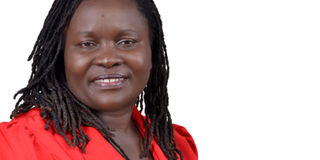Reflecting on 2016 polls and implications for 2021

Emilly Comfort Maractho
Last week we went to the polls to choose our leaders for the period 2021-2026. Every election season affords us an opportunity to look back on the previous one, see if there are lessons and what can be done differently.
Looking back on 2016, and what we have been seeing during this election circle, especially the broken relationship between the media and the State or some of its representatives, one could say we should have seen it coming.
Digital media, known as the application of text, audio, video and graphics transmitted over the Internet or computers, have tested the limits of free speech in new ways for Ugandans, and forced regulators into unknown spaces. It has defined the way critical messages reach the electorate, and the impression created for international actors.
When the otherwise powerful Uganda Communications Commission (UCC) was reduced to writing to Google to complain and the Media Council trying hard to exclude those that chose to use their communication rights in unprecedented ways, by calling on journalists to register or not cover the elections, one got the sense these were no ordinary times.
By 2016, we had warning signs that there would be a further slide from the democratic path. Even then, I did not imagine that real bullets would fly in the way that we have seen.
The most critical concern remained the unfair playing field and the structural issues that bound them, including the perceived fusion of the state and the political party in power. Most people in the National Resistance Movement (NRM) appear to rest in the knowledge that a descent number of Ugandan votes lay in the rural areas, where some people joke that goats and cows cast valid vote. These concerns became real issues from 2001 and we learnt to ignore them. Still, the fears of Opposition politicians in various political parties over unlevelled playing field are well documented in this period.
Yet, we probably did not estimate the extent to which social media would play a part in defining the actors in the political space. In a way, social media has disrupted the way media and democracy relate.
In the current election, they have no doubt increased avenues for discussion of issues and debate among the electorate. An hour on Twitter can give you real headache. Media production became a common thing, no longer a preserve of journalists.
With it has come some of the critical dangers. Never before has tribalism and patronage been a hot topic during elections. Evidence is posted at will. Social media became the new space for scary hate speech and intolerance. Some journalists have told me it is difficult to even be objective, without being abused where some candidates are concerned.
Despite all that, social media has raised the bar, brought optimism for facilitating democracy and development, although that optimism may die when they do not translate to real votes.
What social media has done this time is creating a deceptive sense of popularity for some and image particularly for foreign observers. There are those who appear to be popular and a few trips to the countryside makes you wonder if they exist. But then there is the overzealous state and NRM machinery in almost every district that ensures a thorough clean-up of posters of Opposition candidates, especially presidential candidates, creating the impression that these are not popular. As such, it may be very difficult to predict these elections, and the most we can do is wake up and vote and wait and see.
What is likely to happen again, and hopefully not, is the shutdown of social media and mobile money services in the week.
In 2016, Godfrey Mutabazi, then executive director of the UCC said he blocked social media sites on election day, February 18, at the urging of the Inspector General of Police, Kale Kayihura.
He had received on February 17, 2016 a telephone call from the IGP, informing him that there was a grave security concern that some individuals wanted to use social media platforms and mobile money facilities to seriously destabilise [the] security of Uganda (The Observer, March 18, 2016).
Given the recent remarks by IGP Martin Okoth Ochola on journalists and the actions of police, there is no telling what his call to Eng. Irene Ssewankambo might be. ‘Shut the Internet?’
Clearly, the 2016 elections gave all indications that there would be a more restricted political space for the 2021 elections. While we did not predict Covid-19, it was cleverly weaponised to restrict political space with huge implications for freedom of assembly, expression and media freedom. By the Electoral Commission banning cameras and phones at the polling stations, they have set themselves up for credibility questions.
Ms Maractho is the head and senior lecturer, Department of Journalism and Media Studies at UCU.




